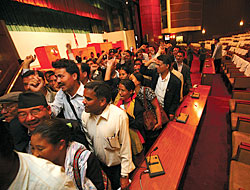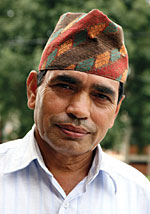 KIRAN PANDAY |
The aspirations of the people are incorporated in the submitted drafts to some extent. But this alone will not guarantee the writing of the constitution. A political mechanism is required to resolve contentious issues such as these:
* Provision of military training for those of 18 years of age
* Use of term 'people's movement' or 'armed insurgency'
* Debate about official languages
* Using 'federal' or 'national' by constitutional committee
* Structure, name and formation of parliament
Semantics shouldn't make any difference, but there are substantive issues on which positions are rigid. Compulsory military training has no meaning in today's world, but the debate over language is very sensitive. There is a need to set up standard measures to categorise languages for different purposes.
The form of parliament has political importance since it is related to the entire political system. The federal structure, political system and system of representation are interrelated. There may be differences on these issues within the concerned committees. That is why there is a provision for a joint meeting of the committees in the CA regulations but it has never met so far.
The committees are functioning without leadership, and their chairs are designated without considering the leadership role of the candidate. The CA members just follow the party's instructions instead of using their own knowledge, experiences and conscience. If the people-elected members limit themselves to their party whip, then one person would be enough to represent a party in the CA.
The constitution writing through CA is not an easy task since ensuring people's participation and incorporating their suggestions makes it complicated politically and thus takes time. However, if the political parties and leadership exhibit a desired understanding and compromise, it can be an easy task. South Africa is an example.
Constitution writing is not a common agenda of our political parties. We have never seen the leaders of two parties sitting together and discussing the issues of constitution writing. They do not attend the CA session and committee meetings.
The 12-week time period for the public to comment on the integrated constitution draft has been reduced to seven weeks. The CA members think this is enough time as they collected their opinions before. This is unfortunate.
There is widespread public scepticism about whether the constitution will be written on time. The people ridicule the CA, and they think it will be written south of the border and we will just endorse it. People presume the PM's visit to India is to arrange for this.
The leaders do not do anything themselves but they see a foreign hand running the government. Despite their rhetoric of democracy, revolution and autonomy, they all have the same 'bidesi prabhu' (foreign overlord).
Nepal is at a turning point for historical political change. Federalism, republic, new political structure, federal and provincial parliament elections will change the polity. Whatever they say to the public, the UML and NC are not willing to see this change. It is difficult to know what the Maoists are thinking. The destination of the Madhesi parties depends entirely on the self-interest of their leaders.
Amid such political uncertainty, the constitution writing process will be delayed for sure. It may be better not to write a constitution than to write a flawed one. This will be a test of the political parties and leaders as well as their political will and commitment for change.
Krishna Khanal is a political science professor at Tribhuban University. This opinion piece is a translated adaptation of the original printed in Nagarik on 16 August.
"It will be written on time"
Rupa Chaudhari, Maoist CA member, Kailali
How did you spend the last year in the CA? 
We declared the country a federal democratic republic then elected the speaker, we set CA rules and regulations and the agenda. Then we established the committees and picked their brains and went to the villages to collect ordinary people's suggestions for the constitution. We wrote constitutional drafts on the basis on these suggestions and conversations with experts. Six committees have finished their preliminary drafts and concept papers. We postponed the deadline because we worried that we wouldn't finish all the work on time.
If the CA hasn't met its own deadline, will the constitution be written on time?
The deadline has been pushed back a couple times but
the constitution will be written on time if the parties find common ground.
How do we make that happen?
Different parties have different opinions and they stubbornly stick to them. There's a lot of dissent. But, they need to think about the bigger issues and put aside differences. Ordinary people and the media can also help. We'll finish the constitution on time if this happens.
Aren't party whips operating in these meetings?
The party positions are being presented unsystematically because there aren't rules to govern them. Of course we have to follow the party line, but there's room for independent thinking too.
"No party whip"
Krishna Prasad Sapkota, UML CA member, Kabhre
How did you spend the last year in the CA? 
We declared the country a federal democratic republic with great enthusiasm and visited villagers and experts for advice about the constitution. We prepared a lot of questionnaires which we distributed to the public and wrote drafts on the basis of the answers we got, but still haven't completed them. Some committees have delivered preliminary drafts with unanimous support from within the committees, but others have struggled to reach consensus. As a result, we're behind schedule.
Will the constitution be written on time?
It's possible, but we are running out of time and the parties are becoming increasingly distrustful of one another. This could further delay the constitution.
What needs to be done for the constitution to be written on time?
CA members should obey the rules and parties should make concessions to one another. There needs to be greater cooperation in every region and level. Committee members must work together to prepare the preliminary drafts on time. If all of this is done I see no reason why the constitution will have to be delayed any further.
Are party whips operating in the committees?
Our party isn't using its whip. The party leadership obviously has some authority over its members, but for the most part they are free to think for themselves.


